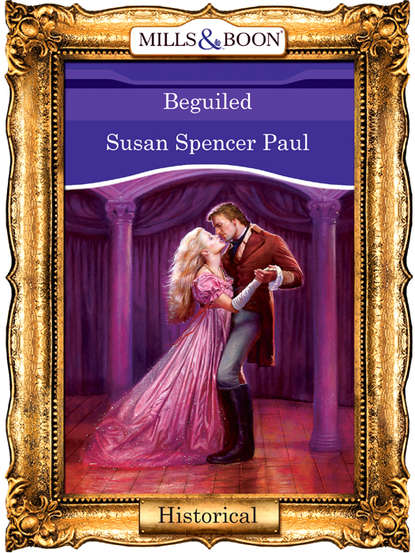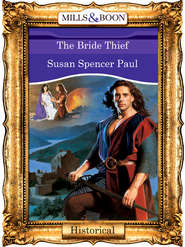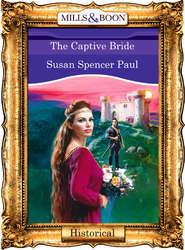По всем вопросам обращайтесь на: info@litportal.ru
(©) 2003-2025.
✖
Beguiled
Настройки чтения
Размер шрифта
Высота строк
Поля
“The angel,” Graydon replied, leaning wearily against the wall, “didn’t say anything. She can’t speak. Either that or she won’t speak. She’s mute.”
Now it was Lord Daltry’s turn to look thunderstruck. “Mute? Cardemore’s sister? Are you certain?”
“I’m certain. Didn’t you wonder why such a beautiful woman wasn’t being fought over by every man in the room? Lady Jersey said that none of the men she’d introduced her to had asked Lady Lillian to dance. I can’t say that I wouldn’t have found some excuse to keep from asking her myself, if I’d known. Fortunately, she seems to be able to hear well enough. She must, for she clearly understood what I was saying to her, and she was able to dance in time to the music. But unless she’s profoundly unable to make simple conversation, I can only conclude that she is mute.”
“But surely Cardemore would have said something.”
“One would think so,” Graydon agreed. “Any decent, normal, civilized man would have. But not Cardemore. I can’t begin to fathom why he kept it from me, but it was a disastrous omission, especially for his beloved sister. I was so surprised when I realized the truth that I very nearly humiliated her, and disgraced myself.” He leaned his head against the bricks, staring up at the sky. “What was she thinking all that time while I chattered on? I don’t even remember what I was saying…some idiotic talk about London, I think. It must have been a nightmare for the poor girl. The way she looked when she knew I’d realized why she was silent.” He groaned and rubbed his forehead. “I can only pray that we finished the dance cheerfully enough that the vultures will be somewhat tempered on the morrow.”
“You recovered well,” Daltry assured him. “And if that look you had on your face when she smiled at you was an act, then you should take up the stage, my boy, and stop depriving the world of your talent.”
Graydon remembered with some discomfort how thoroughly Lady Lillian’s smile had stunned him. She was one of the most beautiful women he’d ever seen, but when she smiled she was something else again. Just the memory made him feel slightly dazed.
“Was she all right after I left?” he asked. “I should have stayed, but I was so angry that it was either leave and take my tongue with me or stay and bid Cardemore to the devil in front of too many of the ton’s best gossips.”
“She seemed a little embarrassed, if that’s what you mean,” Daltry confided, “but no damage was done. A few other fellows approached her. Seaborne Margate, for one. I suppose, having seen you come out of the experience intact, they decided she was safe.”
“She danced, then?”
“No. She evidently didn’t appear safe enough for that. But it didn’t matter. Lady Isabel declared that she was tired and wanted to leave. They make a habit of keeping country hours in the city, or so the chit informed me.”
“Lady Isabel?” Graydon grinned at his friend. “Did you dance with her, Matthew?”
“If you could call it that.” Lord Daltry gave a wry chuckle. “It was more like a wrestling match, trying to lead her about. Gad, she’s got more muscle on her than my younger brother. And when she got excited, which was every five seconds, she squeezed my fingers so hard I can swear that they’ll be bruised in the morning.” He shook the hand in question as if to drive the painful memory away. “They go riding every morning, she and Lady Lillian, sun, rain or snow, and she wanted to retire early so that she might rise before the dawn. Lady Lillian looked thoroughly relieved to go.”
“I’ll wager she did.” With a sigh, Graydon turned and began to walk back in the direction of Almack’s. “A woman without a voice. What does Cardemore expect of me? She’ll be accepted only so far in society, to the point where her muteness doesn’t make those around her uncomfortable, but beyond that…”
“I don’t know why she should have any trouble,” Daltry put in. “A beautiful woman who can’t chatter a man half to death sounds like the ideal female to me. I should think every unmarried man in Christendom would want to wed her.” He grinned at his somber friend, who didn’t share his attempt at humor.
“It’s a damned shame,” Graydon said, “for a remarkable beauty to be cursed with such a frailty.”
“You make too much of it,” Daltry argued. “So she hasn’t got a voice. That doesn’t mean she can’t make herself understood, perhaps even well enough to manage a house and be a hostess and raise a herd of children. A man doesn’t want more than that in a wife, does he? And who needs a voice to listen to when you’ve got a face like that to gaze at across the breakfast table?”
“Would you marry a woman who couldn’t speak, Matthew?”
“Me?” Lord Daltry sounded as shocked as he looked.
“I thought not,” Graydon said. “You see how it is. And that’s not the worst of it. You know what people think of the deaf and mute. She’ll be labeled a lackwit, or demonpossessed.”
“I suppose that’s so,” Daltry put in more thoughtfully. “I’ve read Sir Benjamin Hatton’s treatise on deaf-mutes. He claims they’re essentially amoral, and under a curse from God. Born that way, they are. But Lady Lillian isn’t deaf, you said.”
“It doesn’t matter. She’ll still be labeled as more animal than human. Only those of us blessed with voices evidently possess souls. Sir Benjamin’s been quite influential in spreading such opinions. Lady Lillian will have far more than her lack of speech to combat if she wishes to make her way in polite society.”
“You’re going to tell Cardemore that what he wants is impossible, then?”
“Not at all. I’m going to do exactly what he asked of me. His sister wants to enjoy her stay in London, and enjoy it she shall. I doubt she knows what she’s asking for, but for the next three months I intend to make certain that Lady Lillian Walford has the time of her life.”
Chapter Four (#ulink_ef689c59-780d-573e-ae4b-622102e28cfc)
The Earl of Cardemore disliked change, especially when it involved his own home. He disliked having the place lit up so that even the least used hallway was as bright as day in the middle of the night, and having more servants about than he required for his lone care, with maids and footmen constantly cleaning and scrubbing and carrying and fetching.
He felt exposed in the light. The scars on his face were more readily visible and it was impossible to hide his overlarge, bulky self. Even when dressed in the most elegant and gentlemanly of fashions, he felt society’s eyes upon him, staring with the kind of revulsion that made him feel more like a beast than a man. Not that he gave a damn about what society thought, but there were a few people whom he didn’t care to distress with his ugliness, and having the most significant among them residing in his home for several months was, for Cardemore, an acutely unpleasant sensation. Every time Lady Margaret looked at him with one of her steady gazes he wanted to put a hand up and cover his face. She was the only woman—the only person—who had the power to make him wish he was something other than what he was.
He had left his home at the age of fourteen and hadn’t returned until the day of his brother’s funeral. He’d had news of his family over the years, and had been aware that George had married, but he’d never actually seen Lady Margaret until that day. There, standing at George’s graveside, he had set eyes on a woman so perfect that his knees had nearly given way from the shock. The remainder of the service passed as something of a blur; he’d been too busy trying to force the workings of his brain into some semblance of order to pay much attention to the proceedings. But it had been of little use. Whatever spell had befallen him at setting sight on Margaret Walford had taken hold, and had maintained its iron grip since. Every time he saw her the passion he felt seized him anew, as if it were the first time all over again. Even now, as she reclined before the warmth of the library fire, her head tilted lazily against the heavily cushioned chair, her eyes closed with weary languor, he stood in the shadows, watching, his heart pounding more frantically than it would ever do for any spectacle that his mistress, or any other woman, might perform for his pleasure. In her sleepy, slightly disheveled contentment, Margaret Walford wielded more power to stun than an avalanche.
“You had a pleasant evening, then?” he asked, wishing that he knew how to be comfortable with her, how to sit near her and converse the way another man might do. “Lily seemed happy enough.”
Opening her eyes, she smiled. “She did, didn’t she? I was so relieved when she finally danced. Before Lord Graydon arrived I thought the evening would be a complete disaster.” More thoughtfully, she added, “It wasn’t what she’d been hoping for, just as we knew it wouldn’t be, but she was so happy afterward. Having the handsomest man in the room for a partner in her first waltz must have been exactly like one of the dreams she’s so often told me about.” Lady Margaret’s smile grew wistful. “Like the dreams every girl has, I imagine. I only wish you had seen them together, Aaron. They made an enchanting couple, and Lily danced with perfection. You would have been so proud.”
“I’m always proud of Lily,” he replied, taking a sip from the glass of whiskey he held. “Graydon observed the proprieties?”
“Oh, yes. He’s everything that a young lord should be, quite perfect in every detail. I doubt there was a girl at Almack’s who wasn’t eaten alive with envy at his asking Lily—and only Lily—to dance.”
The sadness in her tone caused Cardemore to stiffen instinctively. “You disliked him, Margaret?”
“Of course not, Aaron. I hardly know the boy enough to disapprove of him. But I worry about Lily. I don’t want to be such a dismal naysayer, but—I know you’ll understand what I mean when I say this—I almost wish we could have gotten it all over with tonight instead of giving her a reason for hope. Even if Lord Graydon should follow through on his promise to take her driving, I’m afraid she’ll still be terribly hurt, perhaps during our next outing. Not one man who was introduced to her tonight would ask her to dance before Lord Graydon did. And then she was so afraid to dance with him that I had to make her do so.”
“She seems to have come through the experience well enough.”
Lady Margaret suddenly sat forward. “Yes, but—”
“We have to give her this chance, Margaret,” he said firmly. “We warned her and she didn’t want to listen, but experience is a far better teacher. After tonight she knows what she’s up against, and it’s her decision if she wants to go on or go home. Lily’s not a quitter. Or a weakling. If she were, I’d never have let her leave Cardemore Hall.”
Lady Margaret pinned him with the sort of tightly angry expression that always made him want to kiss the breath out of her. “Lily isn’t you, Aaron, or even remotely like you. She’s a naive, sheltered young woman. She wouldn’t be able to go through the kind of ‘experiences’ you’ve had and come out intact.”
Cardemore couldn’t repress the laughter her words caused. “My dear Lady Margaret, I hardly think you can compare a season in society to spending fifteen years in the company of pirates, thieves and murderers. I admit there are some daunting similarities among the main actors, but at least Lily need never worry that Mrs. Drummond-Burrell might stick a dagger between her shoulders if she doesn’t make a proper curtsy.”
“Words and deeds, Aaron, can be just as painful as a physical attack. In the hands of a Mrs. Drummond-Burrell, perhaps even more so.”
“Mrs. Drummond-Burrell,” remarked Cardemore, “attacks Lily at her own peril. You needn’t worry over the matter.”
Lady Margaret shook her head with clear dissatisfaction. “So we just let Lily go on until she meets with disaster, is that it? Tonight wasn’t humiliating enough. We must let her continue until polite society brings her to her knees?”
He’d been acutely in love with Margaret Walford during every minute that had passed since he’d set eyes on her, but there was something about moments like this, when she gave way to her hot Irish temper, that always made him think about what it might be like to take her to his bed and make love to her. Her unbound mahogany hair would be a glorious sight against the purity of snow-white sheets.
“Society won’t bring Lily to her knees,” he assured her with as bland a tone as he could muster. Walking out of the shadows, he set his empty glass on a nearby table with stark finality. “I’ll not allow it.”
Lady Margaret pushed to her feet and stood full height, her chin lifting stubbornly. “My lord, I understand a little about the power you wield, perhaps too little, but even you can’t make all of society obey you.”
“I don’t require that all of society do so. Only those few whom I deem necessary. And you’re quite right. Despite whatever I’m able to do in smoothing matters over, Lily must find her own way. I didn’t want her to come to London any more than you did, but we couldn’t very well bury her in Somerset when she didn’t want to be buried.”
“She wasn’t buried,” Lady Margaret countered. “She has friends there who love and accept her, and days filled with activities she enjoys. Her life has been full and happy.”
“Not enough, evidently, to keep her from dreaming of London,” he remarked quietly.
She gave a long sigh and, although he wasn’t watching, Cardemore could almost see the softening in her stance. She moved toward him, so near that he could hardly hear her speaking over the thunderous pounding of his heart in his ears.
“I know you’re right, Aaron. I only wish I could find a way to stop worrying on the matter. It’s been a long time since we’ve argued about Lily.” He heard the smile in her voice and felt an answering smile form on his own lips. “Do you remember how we used to fight over her?”









